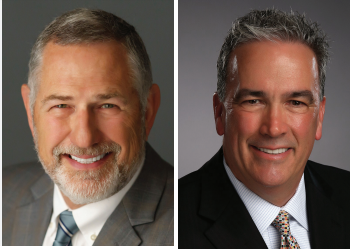Establishing office authority depends on being a leader, not an authoritarian. Drs. Joel Small and Edwin McDonald show how authority is not a prerequisite for influence.
 Drs. Joel C. Small and Edwin McDonald show how leadership styles affect practices’ productivity
Drs. Joel C. Small and Edwin McDonald show how leadership styles affect practices’ productivity
As practice owners, we are in a position of authority. How we choose to use that authority will directly impact the nature of our practice culture. Doctors and practice managers who rely on their authority alone can create highly productive practices, but how sustainable are cultures driven by authority? Furthermore, how does our staff react to authority? For example, authoritarians may have highly productive staff, but staff respond to authoritarians and their directives out of fear. The job is getting done according to the doctor’s directives, but a culture driven by fear is a culture of compliance as opposed to commitment. Compliant cultures tend to stagnate over time as team members lose their will to think independently and no longer offer creative feedback that is vital for practices to thrive. We have observed that cultures of compliance are unstable and unsustainable — typified by blame, low staff morale, and increased turnover.
Influencers are a different breed of leaders. Like authoritarians, they can create highly productive practices, and a casual observer would have trouble distinguishing between the two types of cultures. This is where the similarities end, however.
A more discerning observer would quickly and easily notice significant differences between the two leadership styles and the cultures they create. Whereas staff submit and comply with the directives of an authoritarian out of fear, the followers of an influencer act out of trust and their belief in the leader. Their culture is one of commitment and is typified by collaboration, cohesiveness, shared values, and their belief in a well-defined future vision.
To be clear, there are significant distinctions between “authority” and “authoritarianism” that must be recognized. Authoritarianism is defined as tyrannical, autocratic, and even dictatorial, whereas authority is defined as the power to give orders or make decisions. Being in a position of authority, like practice owners or office managers, has many benefits, not the least of which is the ability to act quickly on decisions and affect change. Leaders who combine their authority with a high degree of influence are by far the best leaders and get the most out of their followers. Numerous studies have validated this assertion.
The sad and unfortunate truth is that many doctors and managers would prefer to be influencers but operate as authoritarians due to a multitude of blind spots. Simply put, many of us are unaware of how we show up for our staff, and we fail to see alternative forms of leadership that would better serve our needs and our staff’s needs.
To this point, the greatest service a leadership coach can provide for a client is to facilitate a high degree of personal self-awareness. As we become more self-aware, we are able to adopt a more realistic vision of how we show up for others. Assessments, like the LCP 360 (www.leadershipcircle.com), are valuable aids in developing personal self-awareness. These assessments are often the very first time doctors/managers get to view their leadership through the eyes of those they lead. We get a close-up view of ourselves from the other side of the mirror and learn what our followers view as our strengths as well as our reactive tendencies that are creating barriers and diminish our influence with our staff. Armed with these valuable insights, we can work to diminish our reactive tendencies, leverage our strengths, and expand our influence — all of which can occur simultaneously.
The day of the command-and-control authoritarian leader is long past. What may have worked during the Industrial Revolution is, at best, no longer effective and, at worst, extremely destructive. Societal changes have altered the nature of effective leadership over time, and those of us that remain stuck in an authoritarian mindset do so at our own peril. Influence now trumps authority, but combining both is the secret sauce to becoming the very best and most effective leader.
It is important to realize that authority is not a prerequisite for influence. Anyone can be an influencer no matter what position they occupy. Some of the most influential people in healthcare practices hold no position of authority, yet their coworkers and even their doctors will seek their counsel and look to their input and guidance when making important decisions. Doctors and office managers should consider seeking buy-in of their team’s influencers before introducing change to their staff. These are the people who will most likely determine how change is perceived by the entire team. Making influencers early adopters of a change initiative will often determine whether it is successful or not.
As an exercise, take a moment to reflect on the most impactful people in our lives — those who helped shape who we are. Were they authoritarians or influencers? What are we bringing forward into our current reality because of their impact? You can bet that some aspects of their impact are being manifested in our leadership. Which manifestations do we want to keep, and which would we like to discard? Sometimes leadership is as much about letting go as it is about acquiring new skills. Letting go of an authoritarian mindset would be a wonderful first step in becoming the effective leader that we were meant to be.
Core values and principles should guide office authority. Read more about how values can serve as a vital and perpetual reference point in Dr. Joel Small’s article, “What do we value? A critical question and a values exercise” at https://endopracticeus.com/what-do-we-value-a-critical-question-and-a-values-exercise/
Stay Relevant With Endodontic Practice US
Join our email list for CE courses and webinars, articles and more..

 Drs. Joel C. Small and Edwin McDonald show how leadership styles affect practices’ productivity
Drs. Joel C. Small and Edwin McDonald show how leadership styles affect practices’ productivity Drs. Joel C. Small and Edwin (Mac) McDonald have a total of over 75 years of dental practice experience. Both doctors are trained and certified Executive Leadership Coaches. They have joined forces to create Line of Sight Coaching, a business dedicated to helping their fellow dentists discover a better and more enjoyable way to create and lead a highly productive clinical dental practice. Through their work, clients experience a better work/life balance, find more joy in their work, and develop a strong practice culture and brand that positively impact their bottom line. To receive their free ebook, 7 Surprising Steps to Grow Your Practice Through Leadership, go to
Drs. Joel C. Small and Edwin (Mac) McDonald have a total of over 75 years of dental practice experience. Both doctors are trained and certified Executive Leadership Coaches. They have joined forces to create Line of Sight Coaching, a business dedicated to helping their fellow dentists discover a better and more enjoyable way to create and lead a highly productive clinical dental practice. Through their work, clients experience a better work/life balance, find more joy in their work, and develop a strong practice culture and brand that positively impact their bottom line. To receive their free ebook, 7 Surprising Steps to Grow Your Practice Through Leadership, go to 
